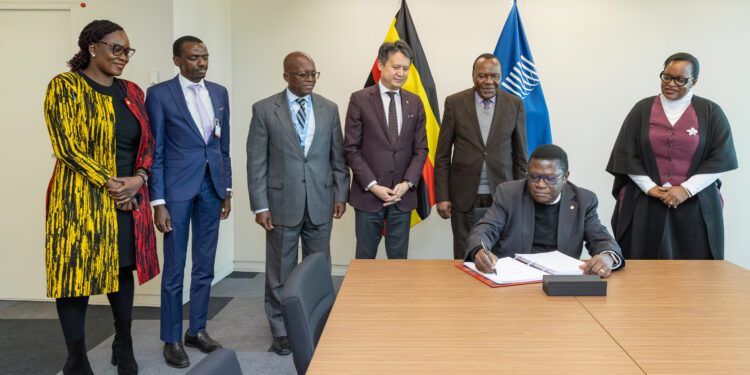On 4th December 2024, Uganda, represented by Hon. Norbert Mao, the Minister of Justice And Constitutional Affairs signed the World Intellectual Property Organisation (WIPO) Treaty on Intellectual Property, Genetic Resources, and Associated Traditional Knowledge (TK), 2024.
The long-awaited treaty marks the conclusion of negotiations that began 24 years ago and highlights Uganda’s commitment to the global intellectual property (IP) framework.
The signing was witnessed by Mr Daren Tang, the Director General of WIPO, Ambassador Robert Marcel Tibaleka, Uganda’s Permanent Representative to the United Nations in Geneva and Ms Mercy K. Kainobwisho, the Registrar General of Uganda Registration Services Bureau (URSB).
In May 2024, WIPO Member States adopted the first WIPO Treaty to address the interface between intellectual property, genetic resources and traditional knowledge. It is also the first WIPO Treaty to include provisions specifically for Indigenous Peoples as well as local communities.
The Treaty aims to enhance the efficacy, transparency, and quality of the patent system, and prevent patents from being granted erroneously for inventions that are not novel or inventive with regard to genetic resources and traditional knowledge associated with genetic resources.
The Treaty establishes mechanisms for balancing intellectual property (IP) rights with sustainable resource use and the protection of traditional cultural expressions, particularly for indigenous and local communities.
The existing intellectual property laws in Uganda, as elsewhere, do not address the unique aspects of traditional knowledge governance and do not offer adequate protection of traditional knowledge, because they promote individual recognition (in contrast to collective aspects of Indigenous communities’ livelihoods); grant monopoly and exclusionary rights, and they require specific identification of a creator or innovator.
The existing IP laws also do not sufficiently protect knowledge relating to the medicinal uses of plants, reproductions of communal works, traditional cultural practices, or spiritual rituals; and conventional intellectual property rights have a limited term of protection. Yet, traditional knowledge is a heritage that must be protected in perpetuity, for the lifetime of the culture, not merely for some fixed period.
The Treaty will transform TK governance in Uganda by preventing bio-piracy through robust documentation and disclosure mechanisms, empowering indigenous communities with fair compensation for their contributions and strengthening national IP systems to align with global standards.
Key provisions of the Treaty include disclosure requirements (Article 3); sanctions and remedies (Article 5); information systems (Article 6) that advocate for national and international databases to support patent examiners; equity and sustainable use (Article 2); and mutual support with other agreements (Article 7)
Uganda becomes the 37th WIPO member state to sign the treaty, which will come into force after ratification by 15 eligible parties.











